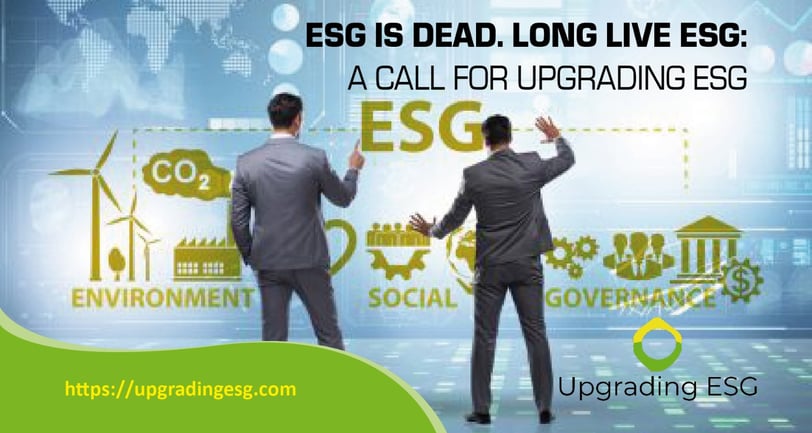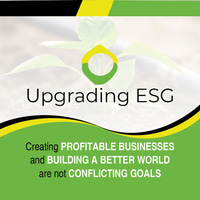ESG is Dead. Long Live ESG
A call to upgrade ESG


In the realm of royalty, when a King or Queen passes away, we declare, "Long live the Queen!" We honour their legacy and hope their unique message endures. Yet, as we bid farewell to one era, we anticipate the reign of a new monarch who will leave their distinctive mark.
Similarly, the time has come to reflect on ESG – Environmental, Social, and Governance – and declare, "Long live ESG!" ESG has played a distinctive role, but it has reached its limit in its current form. The call for transformation resounds, and thus, the birth of the Upgrading ESG initiative.
The war on ESG
I found these words encouraging.
“Anyone who drops ESG in the title of their firm, product, or collateral was (and is) a con artist. You're a fraud. You never looked at a data point. If you're afraid of an acronym, you weren't that serious. That means, yes, Larry Fink was never the angel of ESG - he was the ESG fraud we all knew he was. - Anyone who sticks with ESG in the title, product, or collateral might actually be doing their jobs. WEAR IT PROUDLY. Reclaim the acronym.” From Matt Moscardi on LinkedIn.
Redefining ESG: A Closer Look
In our journey to upgrade ESG, we're exploring different paths to make a bigger difference:
Clearer Impact Language: Words have power. We're making ESG's language more meaningful to make a real impact. Our goal must be is to turn trendy terms into actual actions, reshaping ESG from rules to purposeful behaviour.
Accountability and Reporting – Unfortunately, despite a standardization of reporting standards led by the IFRS – it looks more like a tick-box exercise than an attempt to promote real change. It falls short on driving companies towards Sustainability and Impact.
Embracing Product Sustainability: We're not just focusing on how companies work but championing Product ESG. This means building sustainability into products from the start. This shift promotes a circular economy and ensures that every product reflects sustainability.
UN Sustainable Development Indicators: We're stepping up monitoring by using the UN's Sustainable Development Indicators. This lets businesses measure their impact against global standards, making things more open and accountable.
Corporate Social Responsibility - Guided by Ethics and commitment by Companies to make a real impact worldwide where they operate. The focus has to be on the global south. One of the challenges of CSR is that it is often seen as a cost rather than an investment. This is because businesses often view CSR initiatives as philanthropy, ather than as strategic investments that can improve their bottom line.
A switch from Carbon to Agro Offsets - The giants like Facebook, Google, telecom companies, supermarkets, mining companies, and oil and gas giants hold the potential to spark change in the countries they engage with. I am introducing a groundbreaking concept—agro offsets. These are not just about offsetting carbon but about making real, tangible impacts. It's about nourishing communities and transforming lives. Empowering people. Healing the Planet.
The need to put aside conflict of interests- In a report, there is a claim that the UN cannot adequately address the climate crisis and “global melting” due to the conflict of interest between the desired economic growth of G20 countries and the exploitation said growth is built upon. We see this conflict in the degrowth movement.
Degrowth is a movement and concept that challenges the traditional focus on economic growth and consumption. It does not mean completely stopping shopping, but rather being more conscious and responsible in our consumption habits.
I want to do a drill-down and explore:
Making the UN Sustainable Development Indicators more effective by companies
The UN's Sustainable Development Goals (SDGs) provide a framework for addressing global challenges and promoting sustainability. To make these goals more effective in companies, several key steps can be taken:
Integration into Business Strategy: Companies should integrate the SDGs into their core business strategy. This involves aligning business objectives with specific SDGs that are relevant to their industry and operations.
Goal Prioritization: Not all 17 SDGs may be equally relevant to every company. Prioritization is crucial. Companies should identify the SDGs that align most closely with their core values, mission, and operations.
Measurable Targets: Setting measurable targets is essential. Companies should establish clear, quantifiable objectives related to the selected SDGs. This allows for tracking progress and holding the company accountable.
Transparency and Reporting: Companies should transparently communicate their efforts and progress towards the SDGs. Following established frameworks like GRI or SASB, regular sustainability reporting can help stakeholders understand the company's commitment and performance.
Supply Chain Integration: Many companies' environmental and social impacts extend beyond their direct operations to their supply chains. Integrating sustainability criteria into supplier selection and engagement is crucial for comprehensive SDG implementation.
Employee Engagement: Employees play a significant role in driving sustainability efforts within a company. Employee engagement programs that promote awareness and participation in SDG-related initiatives can be highly effective.
Innovation and Collaboration: Companies can foster innovation by collaborating with other organizations, including NGOs, governments, and industry peers, to address complex sustainability challenges outlined in the SDGs.
Impact Measurement: Establishing robust metrics to measure the company's impact on the SDGs is essential. This includes both quantitative and qualitative indicators to assess progress accurately.
Continuous Improvement: Sustainability is an ongoing journey. Companies should regularly evaluate and refine their SDG strategies to adapt to changing circumstances and evolving sustainability goals.
Leadership Commitment: A strong commitment from the company's leadership is vital. Executives and board members should champion sustainability efforts and ensure that SDG integration is a priority.
In summary, making the UN's Sustainable Development Goals more effective in companies requires a holistic approach that involves strategic alignment, goal prioritisation, measurement, transparency, and a commitment to continuous improvement. When implemented effectively, the SDGs can drive positive social and environmental impact while also contributing to the long-term success of businesses.
I have prepared a more detailed review of Corporate Social Responsibility Investment by some of the most profitable companies in my premium susbtack channel. This makes very interesting reading and opens many opportunities for entrepreneurs to funding opportunities and more.
I do want to highlight a practical example and take inspiration from India's Business Responsibility Report, these principles guide us:
• Being Honest and Responsible: Doing things ethically, transparently, and being accountable.
• Thinking Sustainability and Safety: Offering goods and services in a way that's safe and sustainable.
• Putting Employees First: Making sure everyone, from employees to partners, is looked after.
• Working with Stakeholders: Respecting everyone's interests and being responsive.
• Supporting Human Rights: Promoting and respecting people's rights.
• Being Responsible in Public Policy: Engaging with public policy in a fair and clear way.
• Promoting Fair Growth: Creating a fair and equal way for everyone to grow.
• Being Responsible to Consumers: Engaging with consumers in a responsible and valuable way. Corporate Social Responsibility is the key to making the world fairer and more sustainable.
"Upgrading ESG: How Businesses Can Thrive in the Age of Sustainability"
I am now in the pre-final stages of the final draft of my book, which challenges traditional business notions by making a strong case for the transformative power of upgrading ESG practices. I have chosen to go with this title. The book seeks to explain why ESG is not merely a compliance requirement but a holistic approach to business that can drive innovation and growth.
Upgrading ESG: How Businesses Can Thrive in the Age of Sustainability challenges the status quo, and I hope to inspire business leaders and concerned individuals alike to see upgrading ESG as a pathway to a brighter, more sustainable future
The Call to Action:
As we say goodbye to the old ESG, we invite you to join Upgrading ESG. Let's shape a future where impact matters more than following rules, where sustainability sparks innovation, and where accountability is unlimited.
I invite you to contact me jeffrey@Upgradingesg.com or join my premium channel, where I will share higher-quality content on “ How businesses can thrive in the age of sustainability”
